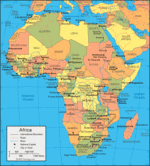by Tolu Ogunlesi

To the outside world, we are all “Africans”.
‘Africa’, that continent of “colourful emergencies” (a term coined by novelist Helen Oyeyemi in a 2005 essay); ‘African’, that oversized brush dripping a paint handy for tarring every living thing found within a thousand-mile radius of the Sahara desert.
As Africans – and by extension African writers – we’re supposed to be united by geography, culture and experience (mostly of the negative sort), and thus a herd of interchangeable entities. There is after all such a thing as African literature, written by African writers, dealing with African issues – poverty, wars, AIDS, Aid, military dictatorships, coup d’états, corruption, civilian dictatorships, and very lately, dubious power sharings.
Never mind that Nigeria and Uganda are no more similar (in my opinion) than America and Russia. Or that Nigeria’s religious dichotomy (and the resulting tensions) confers on it a greater similarity with India than with South Africa. Or that Nigeria and fellow English-speaking Ghana are separated by two impregnable walls of language known as Benin and Togo. Or that a conference proclaimed as a “Festival of Contemporary African Writing” will very likely be no more than a Festival of Anglophone African Writing.
Chimamanda Adichie’s short story, Jumping Monkey Hill (first published in Granta 95, and which appears in her story collection, The Thing Around Your Neck) – which William Skidelsky, writing in the Guardian (UK) calls “the most obviously autobiographical (and funniest) of the stories in The Thing Around Your Neck” – tells the story of an “African Writers’ Workshop” for which the British Council has selected participants.
The workshop is overseen by Edward Campbell, “an old man in a summer hat who smiled to show two front teeth the colour of mildew.” Campbell is British, with a “posh” accent, “the kind some rich Nigerians tried to mimic and ended up sounding unintentionally funny.” He is also the final authority – using what one might call his “Africanometer” – on the quality and plausibility of the stories produced during the workshop.
At the workshop are a Ugandan, a white South African, a black South African, a Tanzanian, a Zimbabwean, a Kenyan, a Senegalese and Ujunwa, a Nigerian. East, West and Southern Africa are represented, the North is not, as is often the case in real life reporting about the continent where the term ‘Africa’ is used to refer to “sub-Saharan Africa” and North Africa is somewhat set apart like some entity off the coast of the real Africa. And, needless to say, the workshop is conducted in English, not French or Swahili.
One of the more interesting scenes in Adichie’s story is when all the writers (except for the Ugandan) gather to drink wine and make fun of one another, and make comments such as: “You Kenyans are too submissive! You Nigerians are too aggressive! You Tanzanians have no fashion sense! You Senegalese are too brainwashed by the French!
This scene took me right back to Crater Lake, venue of the 2006 Caine Prize workshop, in which I participated. NM, a young South African novelist and I were roommates at the Crater Lake resort where the workshop took place. As ‘African writers’, we should have instinctively known everything about each other’s countries. We should have been able to complete one another’s sentences.
But not exactly. We were different people, with little experience of each other’s daily realities.
Read more »
